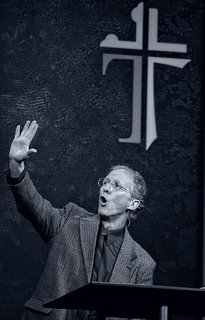Yesterday we began sharing the transcript of my interview with John Piper at New Word Alive. Today we continue with John Piper talking about passionate preaching. The video of today’s segment can be seen here.
Adrian
People do talk about you, John, as having a real sort of passion about you. It’s almost like a zeal, I guess. In fact, particularly when you’re preaching, I certainly experience that, having actually only heard you for the first time in the flesh last night, and so many people afterwards were saying the same thing. I was just blown away by the passion, and also by a sense of the presence of God that you brought when you were preaching. I guess that’s probably the best way of describing it. Is that something that you’re aware of in some way for yourself? Is that something you can explain a bit as to why you feel that other people experience that? Is it something you feel yourself when you’re preaching as well? How did that come about? Because I know, for example, that Lig Duncan said that when he heard you preach at Together for the Gospel, he felt, “Boy, I’ve never preached before. I’ve never done it.” So what is it about you? Is there something special about you? Do you have some kind of secret you can share with the rest of us?
John
I don’t usually feel that way when I’m done preaching, okay? I talked to Don Carson one time, and I regard Don as a very effective communicator and a brilliant person. He mentioned to me that he regularly walks away from his events feeling that he’s blown it, which made me feel better, because I don’t think you can ever quite know what God’s doing. At the times that I have felt bleakest about the way I did what I was supposed to do, others have testified to being helped. And the times I felt liberated, free, engaged — Did anything happen in them rather than just in me? So, I’m very suspicious about the way I feel about my preaching. I doubt myself regularly that my assessment of what just happened is accurate. Which helps me and hurts me. It means I never feel very excited about what I’ve just done, and it means I don’t fall out the bottom because I say, “Well, God can do what he wants to do. You know, Balaam’s ass can accomplish what he wants, so he might use that, even though I felt terrible about it. So I’m a lousy judge when it comes to saying, “Was there a presence of God, or was there an anointing, or was there an effect?”
He mentioned to me that he regularly walks away from his events feeling that he’s blown it, which made me feel better, because I don’t think you can ever quite know what God’s doing. At the times that I have felt bleakest about the way I did what I was supposed to do, others have testified to being helped. And the times I felt liberated, free, engaged — Did anything happen in them rather than just in me? So, I’m very suspicious about the way I feel about my preaching. I doubt myself regularly that my assessment of what just happened is accurate. Which helps me and hurts me. It means I never feel very excited about what I’ve just done, and it means I don’t fall out the bottom because I say, “Well, God can do what he wants to do. You know, Balaam’s ass can accomplish what he wants, so he might use that, even though I felt terrible about it. So I’m a lousy judge when it comes to saying, “Was there a presence of God, or was there an anointing, or was there an effect?”
I just know that what I want is the gift of self-forgetfulness in what I would call a full engagement, a full passion, a full zeal with what’s there in the text, and the reality of God in and through the text. I want to see him, and know him, be engaged by him, be thrilled by him, say it with whatever effectiveness I can, and let the chips fall where they will. And that, as far as my own subjective awareness goes, that rises and falls. One Sunday I feel thrilled. I feel met. I feel carried. I feel helped. And others I don’t. But that doesn’t correlate necessarily with what God is doing in the people out there. So, to me, an effective, experienced sermon would be when I forget myself. I’m not thinking, “Oh, I’m doing well here,” or “I’m doing badly here,” or “That was an effective comment,” — anything like that ruins it for me. The gift is when you’re not outside yourself watching yourself. You’re so here—you’re so here that you’re not at all conscious—there’s no two of you, there’s just one of you, and God and the people, and a transaction is happening that’s a miracle. Because you can’t choose to forget yourself. The act of choosing to forget yourself is self-awareness. So it’s a gift. It’s a phenomenal precious gift in the moment. You pray for it ahead of time, and it may come for twenty minutes and then you lose it for ten, and you’re thinking about your hands, and you’re thinking about your notes, and you’re thinking about the faces out there, and it’s all discombobulated, and then it may be taken away in the moment, and you’re free to . . . you go, and you wake up ten minutes later and — What was THAT? You know? That was free!! So that’s what I’m after.
I think there are ways to cultivate what I’m talking about. It basically is cultivating God-centeredness. It’s cultivating prayer. It’s cultivating a serious engagement with the Word. It’s cultivating asking certain kinds of God-centered, Christ-exalting questions. There’s a focus and a preoccupation. And then my root Christian hedonism, I mean, my root philosophy of life — whether you are satisfied in God really does make a difference as to whether you can glorify God! That’s a huge thing! It’s a theoretical construct that I think is in the Bible, but it has a practical effect because I really believe that if you’re not passionate about God, you won’t glorify him as much. If you’re more passionate about football than God, you glorify football. If you’re more passionate about food or cooking or sex or money or work or the stock market than you are about God, then that’s what gets glorified. God is most glorified in us when we are most satisfied in him. That construct of reality has an effect on how you pray about your life and how you live you life.
Continued in part 3 . . .
















